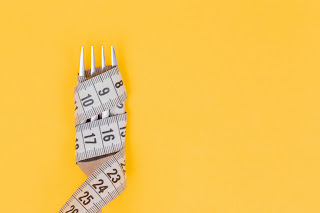What is diet culture?
Diet culture. It’s everywhere and you might not even realise it. This blog post follows on from my earlier post. Where I spoke about one aspect of diet culture – trying to make every meal healthy. There are so many other parts of diet culture that creep into our everyday lives.
What is diet culture?
Diet culture is the idea that thinness is the most important thing we should be aiming for. In other words, thin = good. Some examples of diet culture include:
- Calling foods ‘good’ or ‘bad’: but food has no moral value, and what you eat doesn’t determine if you’re a good person.
- Praising all weight loss, regardless of the cause: but not all weight loss is done in a healthy way, and weight loss can also be a sign of illness or disease.
- Trying to supress your appetite with lollipops or skinny teas: but the only thing that suppresses your appetite is food. It’s okay to listen to your hunger signals and eat.
- Cutting out food groups for no reason: but restricting food groups without a medical reason has no benefit and can make you more anxious around food.
- Describing foods as ‘clean’ ‘guilty pleasure’ or a ‘treat’: but food labels that don’t have any meaning puts food in a hierarchy that it doesn’t need to be in. Food should be described as what it is.
- Doing extra exercise to burn off food or to earn food: but exercise should be movement you enjoy, not a way to earn extra food or to compensate for eating. You deserve to eat simply by existing.
- Trying to ‘healthify’ every meal e.g., lettuce buns instead of burger buns: vegetables aren’t substitutes for carbs, it’s okay to eat them. Food is more than the nutrients it contains.
Diet culture tries to tell us that being thin is the most
important value, but we know this isn’t true.
Weight doesn’t equal health:
One of the key flaws of diet culture is that weight doesn’t
equal health. Your weight is just a number. It’s not the only measure to
be thinking about. It doesn’t tell you your body composition or how ‘healthy’
you are.
You could be a healthy weight but have disordered eating
habits. You could be a healthy weight but smoke 20 cigarettes a day. You could
be a healthy weight but only get 3 hours of sleep every night.
This is why listening to diet culture isn’t helpful. You can’t look at someone and tell how healthy they are.
It doesn’t consider other aspects of health:
As I said earlier, health looks at the whole picture, not
just weight. There are other areas of your lifestyle that you could try to
improve that diet culture doesn’t consider.
Getting a good night’s sleep is crucial to feeling well
rested and ready for the day. 36% of UK adults struggle to sleep on a weekly
basis. Reducing stress can also reduce your risk of disease and improve your
mood. By diet culture focussing just on weight and appearance, it doesn’t
mention other things we can do to improve our wellbeing.
Key points:
- Diet culture is the idea that we should all desire to be thin at any cost.
- Examples of diet culture include: calling food ‘good’ or ‘bad’, exercising to ‘earn’ food, and trying to supress your appetite with lollipops instead of food.
- Weight doesn’t equal health – health is a state of physical, social, and mental wellbeing.
- There are lots of positive lifestyle changes you can make that aren’t about weight. Trying to get enough sleep and reduce stress are good ways to improve your wellbeing.
I hope you enjoyed this post! I’d love to hear your thoughts
in the comments below.
Bye for now! 👋
References:
Diet culture: https://isarobinsonnutrition.co.uk/blog/what-is-diet-culture
Definition of health: https://www.who.int/about/governance/constitution
Sleep issues: https://www.issuesonline.co.uk/articles/insomnia-statistics-uk-2021-how-many-people-have-sleep-problems




.jpg)

Comments
Post a Comment